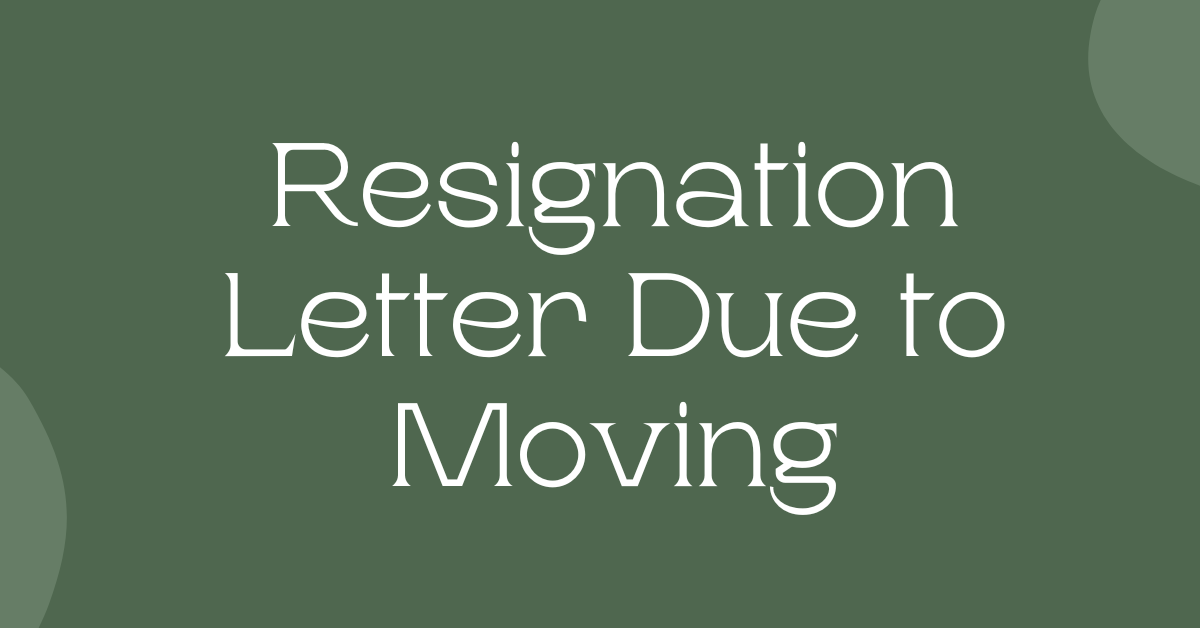When you’re moving away from your current job, it’s essential to inform your employer professionally and courteously. A resignation letter due to moving accomplishes this task by formally announcing your decision to leave the company due to relocation. This letter serves as a formal record of your resignation and helps maintain a positive relationship with your employer, which can be beneficial for future references.
In this article, we’ll provide you with a variety of resignation letter templates/examples/samples due to moving. These samples are designed to make it easier for you to craft your resignation letter, whether you’re moving to a new city or country. By using these templates, you can ensure that your resignation letter is clear, concise, and respectful, making the transition smoother for both you and your employer.

Sample of a Resignation Letter Due to Moving
[Your Name]
[Your Address]
[City, State, Zip Code]
[Email Address]
[Phone Number]
[Date]
[Employer’s Name]
[Company Name]
[Company Address]
[City, State, Zip Code]
Dear [Employer’s Name],
I am writing to formally resign from my position as [Your Job Title] at [Company Name], effective [Last Working Day, typically two weeks from the date of the letter]. Due to personal circumstances, including an upcoming relocation to [New City, State], I find it necessary to step down from my current role.
I have thoroughly enjoyed my time at [Company Name] and am grateful for the opportunities for growth and development that I have experienced here. I have learned a great deal from my colleagues and have valued being part of such a dynamic team.
I will ensure that the transition period is as smooth as possible and will assist in training my replacement, if needed. I am confident that my colleagues will continue to excel in their roles, and I wish the company continued success in the future.
Thank you for your understanding and support during this time of transition. I look forward to staying in touch and hope our paths may cross again in the future.
Sincerely,
[Your Name]
How to write a Resignation Letter Due to Moving
Writing a resignation letter due to moving can be a challenging task, but with the right approach, you can craft a professional and respectful letter. Follow these steps to ensure your resignation letter is effective and leaves a positive impression:
1. Start with a Clear Statement:
Begin your letter by clearly stating your intention to resign and the reason for your resignation, which in this case is due to moving. This sets the tone for the rest of the letter.
2. Express Gratitude:
Express gratitude for the opportunities and experiences you’ve had at the company. This shows appreciation for your time there and leaves a positive impression.
3. Provide a Notice Period:
Offer a standard notice period of two weeks, as this is customary in most industries. This gives your employer enough time to find a replacement and ensures a smooth transition.
4. Offer Assistance:
Offer to assist with the transition process, such as training your replacement or completing any pending tasks. This demonstrates professionalism and a willingness to help.
5. Keep it Concise:
Keep your letter concise and to the point. Avoid including unnecessary details or explanations. Focus on the main points of your resignation and keep the tone respectful.
6. Close on a Positive Note:
Close your letter on a positive note, reiterating your gratitude for the opportunity to work at the company and expressing your best wishes for its continued success.
7. Proofread and Edit:
Before sending your letter, carefully proofread it to ensure there are no spelling or grammatical errors. Editing is essential to maintain a professional tone and ensure clarity.
By following these steps, you can write a resignation letter due to moving that is professional, respectful, and leaves a positive impression on your employer.
Tips and Tricks about Letter
1. Be Clear and Concise:
Keep your resignation letter clear and to the point. Avoid including unnecessary details or explanations. Focus on stating your intention to resign due to moving and providing a standard notice period.
2. Express Gratitude:
Express gratitude for the opportunities and experiences you’ve had at the company. This shows appreciation for your time there and leaves a positive impression.
3. Offer Assistance:
Offer to assist with the transition process, such as training your replacement or completing any pending tasks. This demonstrates professionalism and a willingness to help.
4. Check Company Policy:
Check your company’s policy on resignation letters and notice periods. Ensure you comply with any specific requirements outlined in the policy.
5. Proofread and Edit:
Before sending your letter, carefully proofread it to ensure there are no spelling or grammatical errors. Editing is essential to maintain a professional tone and ensure clarity.
6. Maintain a Professional Tone:
Keep your tone professional and respectful throughout the letter. Avoid using overly emotional language or negative comments about the company or colleagues.
7. Follow Up:
After sending your resignation letter, follow up with your employer to ensure they have received it and to discuss any further steps that may be required. This demonstrates your commitment to a smooth transition.
FAQs about a Resignation Letter Due to Moving
When writing a resignation letter due to moving, there are several common questions that may arise. Here are some of the most frequently asked questions:
1: How should I address the recipient in my resignation letter?
You should address the recipient by their name and title, such as “Dear [Employer’s Name].” This shows respect and professionalism.
2: What information should I include in my resignation letter?
In your resignation letter, you should include your intention to resign, the reason for your resignation (moving), your last working day, and any offers of assistance during the transition period.
3: How much notice should I give in my resignation letter?
It is customary to give at least two weeks’ notice in your resignation letter. This allows your employer enough time to find a replacement and ensure a smooth transition.
4: Should I mention the reason for my resignation in my letter?
Yes, it is important to mention the reason for your resignation, especially if it is due to moving. This provides context for your decision and helps your employer understand your situation.
5: Can I include a personal note in my resignation letter?
Yes, you can include a brief personal note in your resignation letter, expressing gratitude for the opportunities you’ve had at the company and wishing them continued success in the future.
RELATED:
Resignation Letter Due to Pregnancy
Resignation Letter To Whom It May Concern
Resignation Letter from Full-time to Part Time
